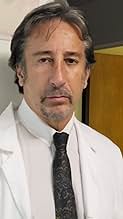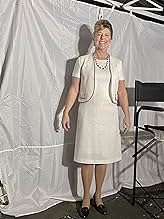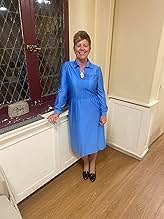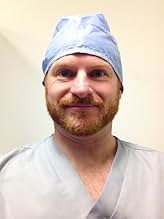1969. La Dra. Audrey Evans se une a un hospital infantil y lucha contra el sexismo, las convenciones médicas y los subterfugios de sus compañeros para desarrollar tratamientos revolucionario... Leer todo1969. La Dra. Audrey Evans se une a un hospital infantil y lucha contra el sexismo, las convenciones médicas y los subterfugios de sus compañeros para desarrollar tratamientos revolucionarios y comprar la primera Casa Ronald McDonald.1969. La Dra. Audrey Evans se une a un hospital infantil y lucha contra el sexismo, las convenciones médicas y los subterfugios de sus compañeros para desarrollar tratamientos revolucionarios y comprar la primera Casa Ronald McDonald.
- Premios
- 4 premios ganados y 6 nominaciones en total
- Dirección
- Guionista
- Todo el elenco y el equipo
- Producción, taquilla y más en IMDbPro
Opiniones destacadas
10CaraN-8
Nearly 50 years ago I was diagnosed with Wilm's Tumor at CHOP and fortunately had Dr. Audrey Evans as one of my Oncologists! Remarkably, a week ago I held hands with my 92 year old mother while watching this wonderful movie at the theater. Audrey truly is an inspiration to all to keep fighting for what we know is right! So hopeful that this will continue to shed light on the importance of continued cancer research and the amazing difference one woman can make during these truly turbulent times. Thank you to all involved for sharing her story, it truly could not have come at a more poignant time! The story, directing, casting was phenomenal! Looking forward to sharing it with my family soon!!
Cinematically honoring an individual for determined, heroic accomplishments is certainly an inspiring and noble reason for making a movie. But, to do justice to the story, the elements need to be engaging, entertaining and compellingly told, which is where this fact-based offering from director Ami Canaan Mann comes up short. The film presents the little-known, fact-based story of Dr. Audrey Evans (Natalie Dormer), a transplanted English pediatric oncologist who took over this practice area at the prestigious Children's Hospital of Philadelphia (CHOP) in 1969. At the time, she proposed the implementation of new treatment strategies for youngsters afflicted by childhood cancer, a radical departure from the standard care in use at the time, which was quite ineffectual as evidenced by its 10% survival rate. She also spearheaded efforts to caring for the considerable financial and daily living needs of the families of these young patients, many of whom were saddled with significant logistical burdens on top of attending to the welfare of their children. Evans often faced an uphill battle from skeptics and naysayers in her quest to put these initiatives into practice, given the departures they represented from established procedures. However, her relentlessly aggressive and persuasive capacity for getting the attention of benefactors and peers, like Drs. Dan D'Angio (Jimmi Simpson), C. Everett Koop (Clancy Brown) and Brian Faust (Brandon Michael Hall), as well as her boundlessly kind compassion for those under her care, ultimately transformed the hospital's cancer treatment program, a model since adopted elsewhere that has raised the successful cure rate to approximately 80%. In addition, her efforts to address the needs of patient families led to the establishment of the first Ronald McDonald House, a program that has subsequently spread globally. To be sure, these are indeed praiseworthy achievements. However, the picture's account of Audrey's efforts is somewhat pedestrian, shallow and meandering, following a rote narrative formula that's predictably on cue and comes across like a virtual replay of events previously depicted much more effectively in director Penny Marshall's endearing, often-underrated release "Awakenings" (1990). There's also precious little attention paid to capturing the mood of the era in this period piece biography, a quality that feels noticeably underdeveloped. To its credit, the film features a fine performance from Dormer and the ensemble of supporting players, but this is far from enough to save the picture from its innate mediocrity and keeping it from being a fitting tribute to the remarkably dedicated work of its protagonist. Dr. Evans courageously demonstrated that her children deserved better than what they were getting, but, unfortunately, the same can't be said here in the telling of Audrey's truly laudable story.
Greetings again from the darkness. Firefighters, Police Officers, and Armed Forces soldiers and veterans are the ones we usually (and rightfully) describe as heroes; yet heroism can also be found in the actions of everyday people. Director Ami Canaan Mann and screenwriter Julia Fisher Farbman introduce us to one such hero in this biopic on Dr. Audrey Evans.
Natalie Dormer ("Game of Thrones") stars as Dr. Evans (the titular Audrey), a remarkable woman behind advancements in pediatric oncology, and also the founder of the first Ronald McDonald House. The film opens in 1969 as Dr. Evans begins her tenure at Children's Hospital of Philadelphia (CHOP). Having trained under Dr. Sidney Farber, she immediately ruffles feathers by pushing the envelope on funding and research for her department. Chief Surgeon, Dr C Everett Koop (Clancy Brown, THE SHAWSHANK REDEMPTION, 1994) recruited her and almost immediately had to deal with her unorthodox approach ... and the complaints from Dr. Jeremy Lewis (Ben Chase, "Law and Order: Organized Crime"). Dr. Lewis is quite put out with this assertive woman going outside the norm to get her way.
It's inspiring to watch the determination with which Dr. Evans takes on all obstacles. Radiation expert, and steadfast rule follower, Dr. Dan Dangio (Jimmi Simpson, "Westworld") sees the potential in what Dr. Evans is pursuing and joins in the mission, as does Dr. Brian Faust (Brandon Michael Hall, "God Friended Me"). Their research methods are exhausting to watch - this was prior to computers, so not only did they have to comb through mounds of paper files, compiling results and drawing conclusions was even more excruciating.
The painstaking work led to the Evans Staging System for categorizing cancer in patients, and it also led to dramatic improvements in survival rates for kids with cancer. "Kids with cancer" ... can there be a more heartbreaking and depressing topic? Trust me, it's painful to see even in a movie. Bits of the movie seem somewhat contrived, especially her brief interactions with kids playing on the sidewalk, as well as with the Vietnam protestors. Additionally, her wardrobe seems incredible for a woman living in an apartment that likely had a 5-foot-wide closet at best. Still, Natalie Dormer delivers a nice performance as this remarkable woman.
It's 1974 when the Philadelphia Eagles owners are persuaded (by Dr Evans) to sponsor the Ronald McDonald House - a charity that, now 50 years later, has proved vital to so many children and families. Of course, the Dr. C. Everett Koop in this story went on to be serve as U. S. Surgeon General in the 1980s, and the full story of Dr. Evans and Dr. Dangio is also quite remarkable. Director Mann runs an interview with an elderly Dr. Evans over the closing credits, and aptly finishes things with Carole King singing "You've Got a Friend". It's always inspirational to learn the full story of real-life heroes, and the life of Dr. Audrey Evans is one we should continue to relish.
Opens in theaters on March 28, 2025.
Natalie Dormer ("Game of Thrones") stars as Dr. Evans (the titular Audrey), a remarkable woman behind advancements in pediatric oncology, and also the founder of the first Ronald McDonald House. The film opens in 1969 as Dr. Evans begins her tenure at Children's Hospital of Philadelphia (CHOP). Having trained under Dr. Sidney Farber, she immediately ruffles feathers by pushing the envelope on funding and research for her department. Chief Surgeon, Dr C Everett Koop (Clancy Brown, THE SHAWSHANK REDEMPTION, 1994) recruited her and almost immediately had to deal with her unorthodox approach ... and the complaints from Dr. Jeremy Lewis (Ben Chase, "Law and Order: Organized Crime"). Dr. Lewis is quite put out with this assertive woman going outside the norm to get her way.
It's inspiring to watch the determination with which Dr. Evans takes on all obstacles. Radiation expert, and steadfast rule follower, Dr. Dan Dangio (Jimmi Simpson, "Westworld") sees the potential in what Dr. Evans is pursuing and joins in the mission, as does Dr. Brian Faust (Brandon Michael Hall, "God Friended Me"). Their research methods are exhausting to watch - this was prior to computers, so not only did they have to comb through mounds of paper files, compiling results and drawing conclusions was even more excruciating.
The painstaking work led to the Evans Staging System for categorizing cancer in patients, and it also led to dramatic improvements in survival rates for kids with cancer. "Kids with cancer" ... can there be a more heartbreaking and depressing topic? Trust me, it's painful to see even in a movie. Bits of the movie seem somewhat contrived, especially her brief interactions with kids playing on the sidewalk, as well as with the Vietnam protestors. Additionally, her wardrobe seems incredible for a woman living in an apartment that likely had a 5-foot-wide closet at best. Still, Natalie Dormer delivers a nice performance as this remarkable woman.
It's 1974 when the Philadelphia Eagles owners are persuaded (by Dr Evans) to sponsor the Ronald McDonald House - a charity that, now 50 years later, has proved vital to so many children and families. Of course, the Dr. C. Everett Koop in this story went on to be serve as U. S. Surgeon General in the 1980s, and the full story of Dr. Evans and Dr. Dangio is also quite remarkable. Director Mann runs an interview with an elderly Dr. Evans over the closing credits, and aptly finishes things with Carole King singing "You've Got a Friend". It's always inspirational to learn the full story of real-life heroes, and the life of Dr. Audrey Evans is one we should continue to relish.
Opens in theaters on March 28, 2025.
I felt that the film was very well balanced. It showed the complexity's of being a woman in a male dominated environment. Her compassion for the children and their parents was self evident. I also liked how easily she could subvert or coerce people to her side. The opening scene of the movie tell you everything you really need to know about her personality. Her tenacity is a blessing and a curse. At times, she doesn't know when to take her foot off the gas pedal and apply the brakes. My only complaint is that I would love to have seen a little bit more of her personal life during this Period. As a Philadelphian I'm a Lil was ashamed that I didn't know anythingabout her.
Absolute incredible production. This story is so heartwarming!! Finally a movie hits theaters that makes you feel, inspires you, makes you want to do good for the world and never give up. The cast absolutely crushed, Natalie was fantastic. Audrey is a hero and the perfect sort of leader. She is funny, kind, smart, brave, strategic and caring. A female that I will always look up to and admire to be like. This film is a must see. This should make waves through the medical industry and re-inspire and reinvigorate doctors around the world. I hope this movie makes an International push as everyone in the world should be privy to this inspiring story. Well done to everyone that touched this project.
¿Sabías que…?
- TriviaFilmed in 23 days.
- ErroresSeveral scenes take place on the roof of the hospital with Philadelphia City Hall nearly next door. The Children's Hospital of Philadelphia from 1916 to 1974 was at 18th & Bambridge which is many blocks away with City Hall not even being visible from the hospital roof.
Selecciones populares
Inicia sesión para calificar y agrega a la lista de videos para obtener recomendaciones personalizadas
- How long is Audrey's Children?Con tecnología de Alexa
Detalles
- Tiempo de ejecución1 hora 50 minutos
- Color
Contribuir a esta página
Sugiere una edición o agrega el contenido que falta

Principales brechas de datos
What is the Spanish language plot outline for Audrey's Children (2024)?
Responda







































